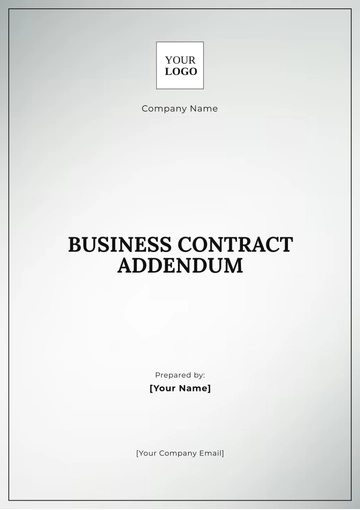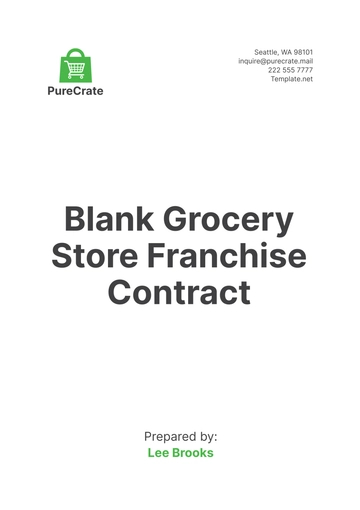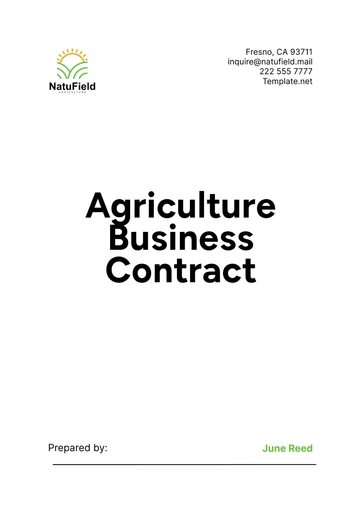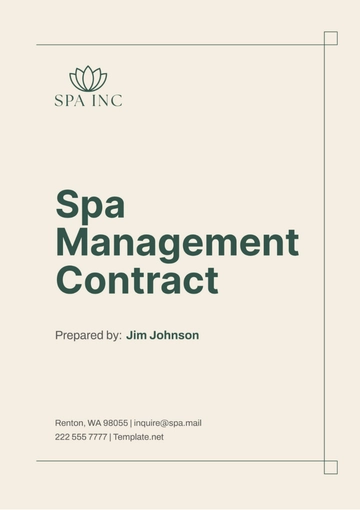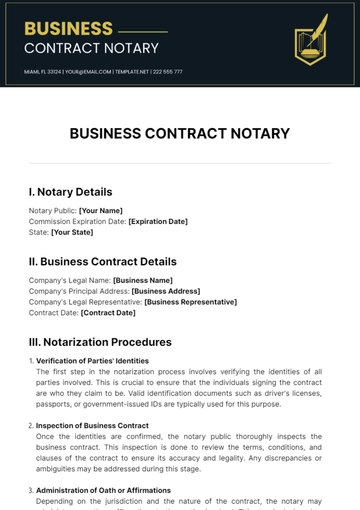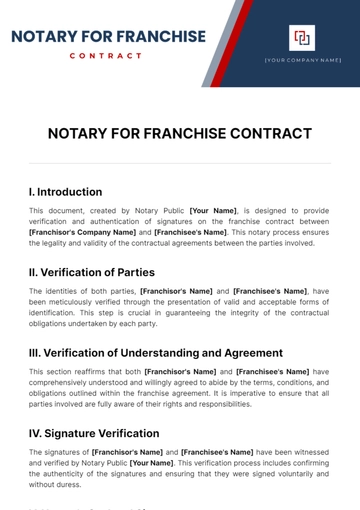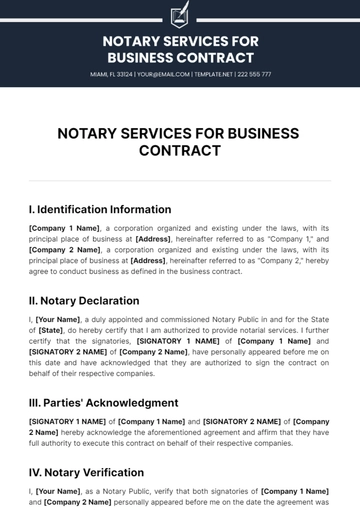Free Agriculture Business Contract
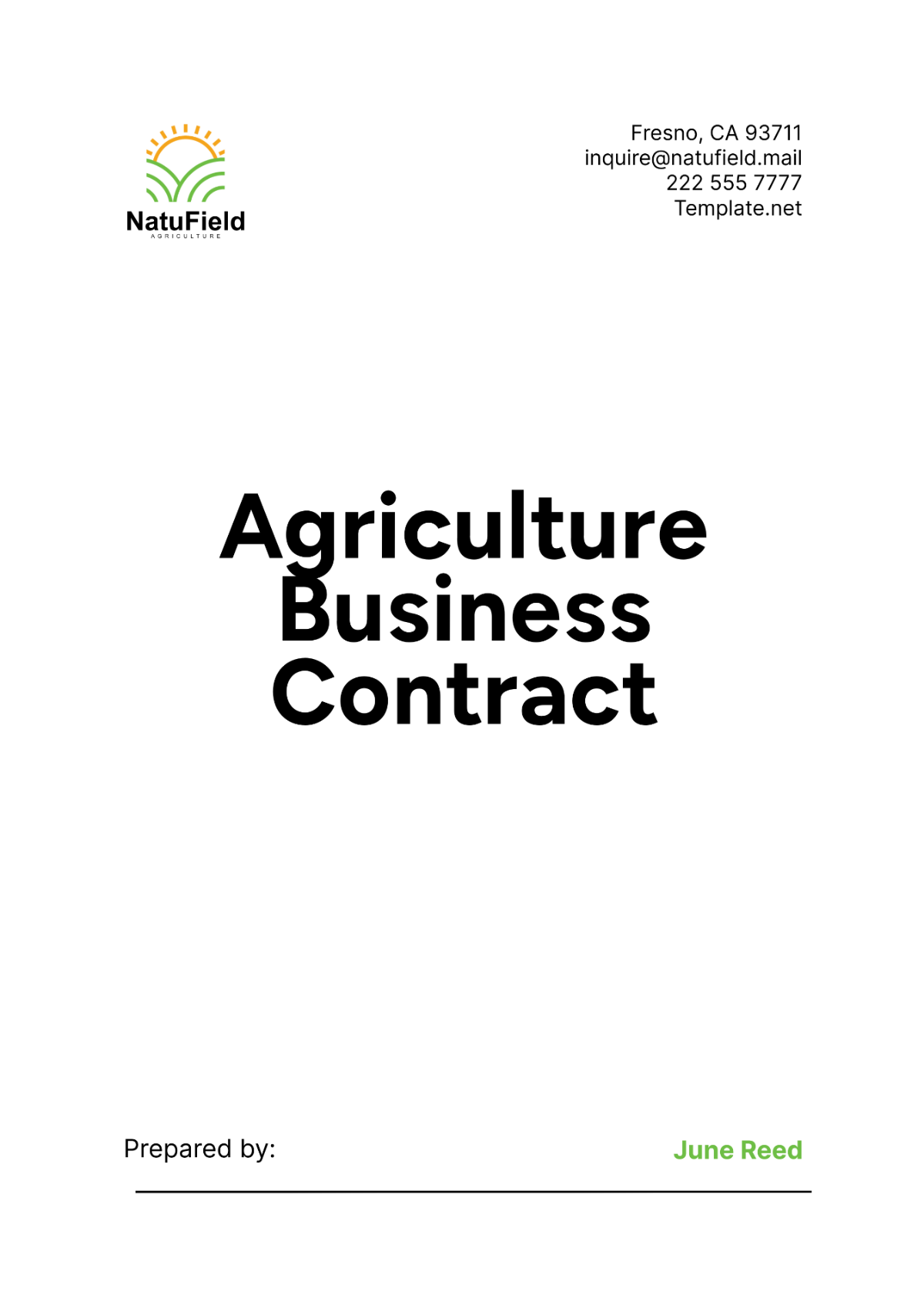
I. The Parties
This Agriculture Business Contract ("Contract") is made and entered into on [Month Day, Year] ("Effective Date") by and between [Your Company Name] hereinafter referred to as the ("Company") with a primary place of business at [Your Company Address] and [Partner's Name] hereinafter referred to as the ("Partner") with a primary place of business at [Partner's Address], may be referred to individually as a ("Party") or collectively referred to as the ("Parties").
WHEREAS, the Company is engaged in the business of agricultural production and distribution.
WHEREAS, the Partner has expertise in agricultural supply chain management and can provide essential resources.
WHEREAS, both Parties wish to collaborate in an agricultural venture to leverage their combined expertise for mutual benefit.
NOW THEREFORE, in consideration of the mutual promises and covenants contained herein, the Parties hereto agree as follows:
II. Objective and Scope
A. Objective
Production and Distribution: To produce, distribute, and market high-quality agricultural products efficiently, ensuring optimal productivity and market reach.
Maximization of Financial Returns: To leverage the strengths of both Parties to maximize financial returns through strategic planning and resource utilization.
Resource Optimization: To optimize the use of resources, including land, labor, and capital, to achieve sustainable agricultural production.
Sustainability: To ensure sustainable and environmentally friendly agricultural practices, minimizing environmental impact and promoting long-term viability.
Contribution to Food Supply: To contribute positively to the local and global food supply chain by providing reliable and quality agricultural products.
B. Scope
Responsibilities: This contract outlines the responsibilities of both Parties in the agricultural venture, including their roles and contributions.
Operational Terms: It sets forth the terms and conditions under which the Parties will operate and collaborate, ensuring clarity and mutual understanding.
Financial Commitments: It specifies the financial commitments, roles, and expected outcomes of the partnership, promoting transparency and accountability.
Production to Sale: The scope of this contract includes production, marketing, distribution, and sale of agricultural products, covering the entire supply chain process.
III. Roles and Responsibilities
A. Company Responsibilities
Capital Provision: Provide the necessary capital and resources for agricultural production, ensuring that the venture has the financial support required for operations.
Regulatory Compliance: Ensure compliance with local, state, and federal agricultural regulations, maintaining legal standards and avoiding penalties.
Operational Management: Manage the day-to-day agricultural operations and workforce, ensuring efficient and effective execution of tasks.
Marketing Coordination: Coordinate marketing and distribution efforts for maximum reach, enhancing product visibility and market penetration.
Quality Control: Implement quality control measures to maintain high standards in agricultural production, ensuring product consistency and safety.
B. Partner Responsibilities
Supply Chain Expertise: Provide expertise in supply chain management and logistics, optimizing the flow of goods from production to distribution.
Permits and Licenses: Assist with securing necessary permits and licenses, ensuring that all legal requirements are met for operations.
Market Analysis: Support with market analysis and strategic planning, identifying market trends and opportunities for growth.
Timely Delivery: Ensure timely delivery of raw materials and other essential inputs, preventing disruptions in the production process.
Resource Management: Aid in the efficient management of resources, promoting sustainability and cost-effectiveness in operations.
IV. Financial Commitments
A. Investment
Company Investment: The Company will invest [$500,000] towards initial setup costs and operational expenses, providing the primary financial backbone for the venture.
Partner Contribution: The Partner will contribute [$200,000] towards working capital and additional resources, supporting the financial needs of the venture.
Future Investments: Both Parties agree to share future investment costs as mutually agreed upon, ensuring continued financial support for growth and development.
Transparent Records: Each Party will maintain transparent records of their financial contributions, promoting accountability and trust between the Parties.
Financial Audits: Regular financial audits will be conducted to ensure accurate tracking and reporting of investments, maintaining financial integrity.
B. Revenue Sharing
Profit Distribution: Net profits from the agricultural venture will be shared as [60]% to the Company and [40]% to the Partner, reflecting their respective investments and contributions.
Revenue Calculation: Revenue will be calculated after deducting all operational costs, taxes, and other expenses, ensuring a fair and accurate profit distribution.
Monthly Statements: Financial statements and profit calculations will be prepared monthly for transparency, providing regular updates on the venture's financial performance.
Revenue Reinvestment: A portion of the revenue may be reinvested into the venture for expansion and improvement, as mutually agreed upon by both Parties.
V. Terms and Termination
A. Duration
Contract Term: This Contract will remain in effect for a period of [5] years from the Effective Date, establishing a long-term commitment between the Parties.
Renewal Option: Either Party may seek to renew the Contract upon mutual agreement before its termination, allowing for continued collaboration if desired.
Continuation of Terms: All terms and conditions will continue to apply during the renewal period, ensuring consistency and stability.
Termination Notice: Termination can be initiated by either Party with a [90]-day written notice, providing adequate time for both Parties to prepare.
Breach Termination: In case of breach, the non-breaching Party can terminate the Contract immediately, ensuring prompt action against violations.
B. Consequences of Termination
Asset Division: Upon termination, all assets and profits will be divided according to the investment ratio, ensuring a fair distribution based on contributions.
Outstanding Obligations: Both Parties will be responsible for any outstanding debts and obligations, maintaining financial accountability.
Final Audit: A final financial audit will be conducted to ensure a fair distribution of assets, providing clarity and preventing disputes.
Return of Resources: Any equipment, resources, or materials provided by either Party will be returned or compensated for, ensuring proper closure of the venture.
VI. Compliance and Legal Requirements
A. Regulatory Compliance
Adherence to Laws: Both Parties must comply with all local, state, and federal agricultural regulations, ensuring legal operations and avoiding penalties.
Permits and Certifications: Necessary permits, licenses, and certifications must be obtained and maintained, supporting lawful and compliant operations.
Food Safety Standards: The Company will ensure that agricultural production adheres to food safety standards, protecting consumer health and meeting regulatory requirements.
Regular Inspections: Regular audits and inspections will be conducted to ensure compliance, identifying and addressing any areas of concern.
B. Environmental Sustainability
Eco-friendly Practices: Both Parties commit to implement environmentally friendly practices in their operations, reducing the ecological footprint of the venture.
Sustainable Farming: Sustainable farming methods will be prioritized to protect natural resources, ensuring long-term viability and productivity.
Waste Reduction: Efforts will be made to reduce waste, conserve water, and maintain soil health, promoting environmental stewardship.
Renewable Resources: Where possible, renewable resources and energy sources will be utilized to minimize environmental impact and enhance sustainability.
VII. Confidentiality
A. Confidential Information
Non-disclosure Agreement: Both Parties agree to keep all proprietary and sensitive information confidential, preventing unauthorized access and use.
Definition of Confidentiality: Confidential information includes business plans, financial data, and intellectual property, safeguarding valuable information.
Breach Consequences: Unauthorized disclosure of confidential information will be considered a breach of the Contract, with appropriate legal action taken.
Post-termination Obligation: The obligation of confidentiality extends beyond the termination of this Contract, ensuring continued protection of sensitive information.
B. Exceptions
Public Information: Confidential information does not include information that is publicly known, ensuring clarity on what is protected.
Independent Research: Information that becomes available through independent research is not considered confidential, promoting transparency.
Legal Requirements: Confidentiality obligations do not apply if disclosure is required by law, ensuring compliance with legal mandates.
Mutual Agreement: Any information disclosed by mutual agreement of the Parties is not considered a breach, ensuring flexibility in information sharing.
VIII. Dispute Resolution
A. Negotiation
Good Faith Effort: Both Parties agree to first attempt to resolve disputes through good faith negotiation, promoting amicable solutions.
Time Frame: Negotiations will be conducted within [30] days of a dispute arising, ensuring timely resolution efforts.
Documentation: Documentation of all negotiation efforts will be maintained for reference, providing a clear record of dispute resolution attempts.
B. Mediation and Arbitration
Mediation Process: If negotiation fails, disputes will be referred to mediation by a neutral third party, seeking an impartial resolution.
Arbitration Clause: If mediation does not resolve the dispute, the matter will proceed to binding arbitration, providing a definitive outcome.
Cost Sharing: The cost of mediation and arbitration will be shared equally by both Parties, promoting fairness in the resolution process.
Arbitration Decision: The decision of the arbitrator will be final and binding, ensuring a conclusive resolution to the dispute.
IX. Amendments
A. Modification
Written Agreement: Any changes to this Contract must be made in writing and signed by both Parties, ensuring formal agreement to modifications.
Documentation of Changes: Modifications will not be valid unless formally documented and agreed upon, promoting clarity and mutual consent.
Impact of Amendments: All amendments must clearly outline the changes and their impact on the Contract, ensuring understanding of new terms.
Approval Process: Both Parties must review and approve any amendments, ensuring that changes are mutually beneficial and acceptable.
B. Waivers
Written Waivers: Any waiver of rights or obligations under this Contract must be in writing, providing formal documentation of the waiver.
Specific Application: A signed waiver will apply only to the specific obligation or right waived, ensuring limited and precise application.
No Implicit Waivers: Failure to enforce any provision of this Contract does not constitute a waiver, maintaining the enforceability of all terms.
Conditional Waivers: Waivers may be conditional and subject to specific terms, providing flexibility and clarity in their application.
X. Miscellaneous
A. Governing Law
Applicable Law: This Contract will be governed by and construed in accordance with the laws of [State Name], establishing the legal framework for the venture.
Jurisdiction: Any legal action arising from this Contract will be subject to the jurisdiction of [State Name], ensuring clarity on the legal venue.
Court Submission: Both Parties agree to submit to the jurisdiction of the courts in [State Name], providing a clear process for legal disputes.
B. Entire Agreement
Comprehensive Document: This Contract constitutes the entire agreement between the Parties regarding the agricultural venture, encompassing all terms and conditions.
Merger Clause: All prior discussions, agreements, and understandings are merged into this Contract, ensuring that all relevant terms are included.
Binding Nature: No other agreements or representations shall be binding unless set forth in this Contract, maintaining the integrity of the document.
Amendment Process: Any amendments to this Contract must be documented and agreed upon, ensuring that changes are officially recognized.
C. Severability
Continued Validity: If any provision of this Contract is found to be unenforceable, the remaining provisions will continue in effect, preserving the contract's overall validity.
Replacement Provisions: Both Parties agree to replace any unenforceable provision with a valid one that reflects their original intent, maintaining the contract's purpose.
Intent Interpretation: This Contract will be interpreted to give effect to the Parties' intentions, ensuring that the original objectives are upheld.
Severability Clause: The severability clause ensures that the contract remains operational and effective, even if some provisions are invalidated.
D. Notices
Written Notices: All notices and other communications required or permitted under this Contract must be in writing, ensuring formal and documented communication.
Delivery Methods: Notices can be delivered personally, sent by certified mail, or emailed to the addresses specified in this Contract, providing multiple methods for effective communication.
Effective Date of Notice: Notices will be considered effective upon receipt or five (5) days after being sent, whichever occurs first, ensuring timely acknowledgment.
Contact Information: Both Parties agree to promptly update their contact information in case of any changes, maintaining effective communication channels.
E. Force Majeure
Definition: Neither Party will be liable for any failure to perform its obligations under this Contract if such failure is caused by events beyond its reasonable control, including but not limited to natural disasters, wars, or governmental actions.
Notification: The affected Party must notify the other Party as soon as possible of the occurrence of a force majeure event, providing details and anticipated duration.
Suspension of Obligations: Obligations under this Contract will be suspended during the period of the force majeure event, with both Parties seeking to resume normal operations as soon as possible.
Mitigation Efforts: Both Parties agree to use reasonable efforts to mitigate the effects of the force majeure event, minimizing disruptions to the venture.
Termination Option: If the force majeure event continues for an extended period, either Party may terminate the Contract by providing written notice, ensuring a fair exit strategy.
XI. Signatures
IN WITNESS WHEREOF, the Parties hereto have executed this Contract as of the Effective Date.
Company

[Authorized Representative Name]
[Your Company Name]
Date: [Month Day, Year]
Partner

[Authorized Representative Name]
[Partner's Name]
Date: [Month Day, Year]
- 100% Customizable, free editor
- Access 1 Million+ Templates, photo’s & graphics
- Download or share as a template
- Click and replace photos, graphics, text, backgrounds
- Resize, crop, AI write & more
- Access advanced editor
Secure business agreements with our Agriculture Business Contract Template! Available on Template.net, this template features customizable fields for business branding. Editable sections make it easy to tailor the contract to your specific terms. The AI Editor Tool ensures efficient and precise contract creation, providing comprehensive agreements for your agricultural operations!
You may also like
- Rental Contract
- Contractor Contract
- Contract Agreement
- One Page Contract
- School Contract
- Social Media Contract
- Service Contract
- Business Contract
- Restaurant Contract
- Marketing Contract
- Real Estate Contract
- IT Contract
- Cleaning Contract
- Property Contract
- Supplier Contract
- Partnership Contract
- Food Business Contract
- Construction Contract
- Employment Contract
- Investment Contract
- Project Contract
- Payment Contract
- Student Contract
- Travel Agency Contract
- Startup Contract
- Annual Maintenance Contract
- Employee Contract
- Gym Contract
- Event Planning Contract
- Personal Contract
- Nursing Home Contract
- Law Firm Contract
- Work from Home Contract
- Software Development Contract
- Maintenance Contract
- Music Contract
- Amendment Contract
- Band Contract
- DJ Contract
- University Contract
- Salon Contract
- Renovation Contract
- Photography Contract
- Lawn Care Contract







